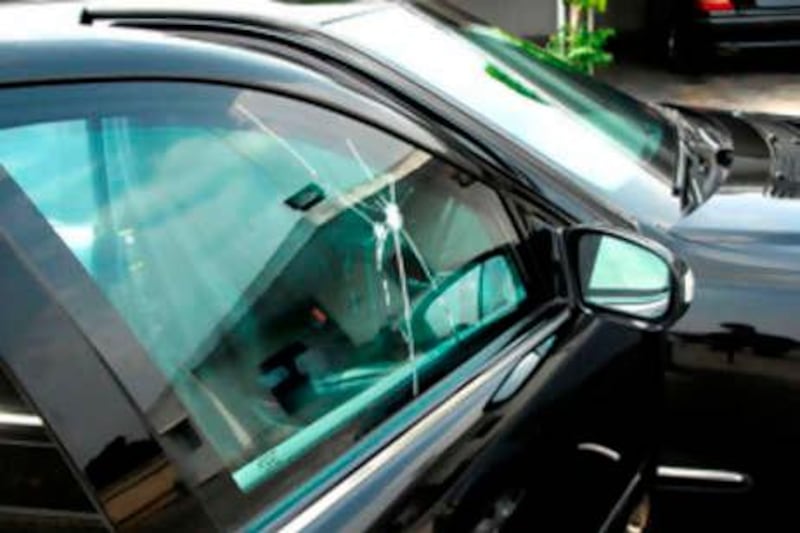ISLAMABAD // Yousaf Raza Gilani, Pakistan's prime minister, was the target of an assassination attempt yesterday, underscoring the country's volatility ahead of presidential elections. But hours after the attack, conflicting reports emerged on whether Mr Gilani was travelling in the motorcade when it came under fire from snipers. No one was injured in the attack. Zahid Bashir, the prime minister's spokesman, said Mr Gilani was not in the convoy when it came under attack on the main motorway linking Islamabad with the nearby city of Rawalpindi.
"Two unknown terrorists had opened fire on the prime minister's squad of cars as it went to pick him up from the airport," he said. "Multiple shots were fired at the prime minister's motorcade. The prime minister is safe, by the grace of God," Mr Bashir said. Earlier, Mr Bashir had said the prime minister had been in the car when the convoy was targeted. Rao Mohammad Iqbal, a senior police official, said: "The car was going towards the airport when it was fired upon from a small hill. Two bullets hit the driver's window." Suspicion fell on pro-Taliban militants, who have repeatedly threatened to kill Pakistani politicians. Militants from Swat, who are engaged in ongoing clashes with the security forces, claimed responsibility for the assassination attempt.
Mr Gilani's government has toughened Pakistan's position against militants in recent weeks by issuing unequivocal statements in support of military operations against them. Pakistan's hyperactive conspiracy mill even suggested the assassination attempt was "drama" staged by the Pakistan People's Party (PPP) to galvanise popular support for its government, which has been heavily criticised over its inability to deal with an economic crisis. Mr Gilani's political enemies and Pakistan's famously meddling intelligence agencies were also among the list of possible suspects behind the shooting. Farah Ispahani, a senior official with the ruling PPP, said the cars were shot at as they were on their way to an airport to pick up Mr Gilani, who was due to return to Islamabad after a day-trip to the Punjabi city of Lahore.
Mr Gilani, 58, was reported to be safe and "continuing his work". Television channels broadcast film showing two bullet dents a few inches apart in the bulletproof window on the driver's side of what was reportedly the prime minister's Mercedes-Benz. The attack took place in a city, Rawalpindi, that has become synonymous with assassinations. It also once again raised the spectre of militants working with "inside knowledge" of senior officials' movements and schedule. Pervez Musharraf, the former president, survived at least two well-orchestrated and serious attempts on his life when setting off from army headquarters in Rawalpindi for the neighbouring capital of Islamabad.
In both attempts, Mr Musharraf, a former military ruler, members of the armed forces were believed to have been behind the attacks. Rawalpindi, the garrison headquarters of the army, was the scene of the assassination of Benazir Bhutto, the former prime minister, in December. The CIA and Mr Musharraf's government blamed Baitullah Mehsud, a tribal pro-Taliban leader, for the assassination. Asif Ali Zardari, Bhutto's husband and now the PPP's leader, accused Pakistan's conservative establishment, which has long had links with militants, of his wife's murder.
Mr Zardari, who is expected to win a presidential election on Saturday, has said he expects his wife's killers to make an attempt on his own life. He has called upon the United Nations to investigate Bhutto's assassination but has notably failed to launch a high-profile investigation since the PPP came to power. Pakistan's first prime minister, Liaquat Ali Khan, was assassinated in Rawalpindi in the 1950s. Since the attempts on Mr Musharraf's life, Pakistan's security services have evolved an elaborate security system on the Rawalpindi-Islamabad road, but the prime minister was not afforded the same level of protection as the former president. Ikram Sehgal, a security analyst, said: "I am really surprised how this thing happened as the route should have been cleared by security experts. "It was not a hi-tech attack. It was a very basic attack, but there has been some security lapse somewhere." Plainclothes police officers were seen with a sniffer dog searching for clues on the small hill from where it was thought the shots were fired. On top of the hill is a large illuminated portrait of Pakistan's founding father, Muhammad Ali Jinnah, and his motto for the country, "unity, faith and discipline". The incident added to tension in Pakistan at a time when its civilian government, which came to power after elections in February, is attempting to counter encroaching pro-Taliban militancy and the country has faced a wave of suicide attacks that have taken 500 lives this year. Shots were fired last week at a car carrying Lynne Tracy, a senior American diplomat, as she was heading from her residence towards her office in the city of Peshawar. No one was hurt. The firing came amid increasingly political tensions on both the national stage and in the politically crucial province of Punjab. Pakistan's politics has shown signs of returning to bitter feuding between the two main political parties ahead of Saturday's election. The Pakistan Muslim League-N (PML-N) of the former prime minister, Nawaz Sharif, withdrew from the PPP's coalition government a week after the two parties succeeded in ousting Mr Musharraf. The PML-N objected to the PPP's reluctance to restore judges sacked by Mr Musharraf and opposed the presidential candidature of the PPP's co-chairman, Mr Zardari. Since Mr Sharif's withdrawal from the government, the two parties have been in high-stakes negotiations to establish whether the PPP will withdraw from PML-N's coalition government in Punjab. iwilkinson@thenational.ae





